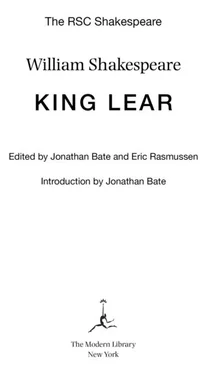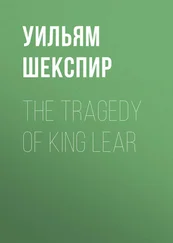уильям шекспир - King Lear
Здесь есть возможность читать онлайн «уильям шекспир - King Lear» весь текст электронной книги совершенно бесплатно (целиком полную версию без сокращений). В некоторых случаях можно слушать аудио, скачать через торрент в формате fb2 и присутствует краткое содержание. Год выпуска: 2011, ISBN: 2011, Издательство: Random House Publishing Group, Жанр: Старинная литература, на английском языке. Описание произведения, (предисловие) а так же отзывы посетителей доступны на портале библиотеки ЛибКат.
- Название:King Lear
- Автор:
- Издательство:Random House Publishing Group
- Жанр:
- Год:2011
- ISBN:978-1-58836-828-7
- Рейтинг книги:3 / 5. Голосов: 1
-
Избранное:Добавить в избранное
- Отзывы:
-
Ваша оценка:
- 60
- 1
- 2
- 3
- 4
- 5
King Lear: краткое содержание, описание и аннотация
Предлагаем к чтению аннотацию, описание, краткое содержание или предисловие (зависит от того, что написал сам автор книги «King Lear»). Если вы не нашли необходимую информацию о книге — напишите в комментариях, мы постараемся отыскать её.
King Lear — читать онлайн бесплатно полную книгу (весь текст) целиком
Ниже представлен текст книги, разбитый по страницам. Система сохранения места последней прочитанной страницы, позволяет с удобством читать онлайн бесплатно книгу «King Lear», без необходимости каждый раз заново искать на чём Вы остановились. Поставьте закладку, и сможете в любой момент перейти на страницу, на которой закончили чтение.
Интервал:
Закладка:
THE DIVISION OF THE KINGDOM
Written soon after King James united the thrones of England and Scotland, and performed in his royal presence at Whitehall, King Lear reveals the dire consequences of dividing a united kingdom. In principle, the aged Lear’s decision to take voluntary retirement does not seem a bad thing: he is losing his grip on matters of state, his daughters and sons-in-law are “younger strengths” with more energy for government, and, most important, the division is intended to prevent a future civil war between rival claimants, which would have been a definite possibility in the absence of a son who would automatically inherit the whole kingdom. But can an anointed king abnegate his role at will? If he does, he certainly should not expect to retain the trappings of power. Goneril and Regan have a case for stripping him of his rowdy, extravagant retinue of one hundred knights.
Lear’s mistake is to link the division of the kingdom to a public show of affection. The two older sisters, well versed in the “glib and oily art” of courtly flattery, tell him what he wants to hear, but Cordelia cannot. She is one of the play’s truth tellers and simply lacks the capacity or the experience to dress her love in fine rhetoric. Lear knows that she loves him best, but we may assume that until this moment her love has always been expressed privately. As youngest and unmarried daughter, Cordelia has probably never spoken publicly before the court. Lear’s intention for the opening scene is that it will be Cordelia’s coming out: she is supposed to give public expression to her great love and in return she will be rewarded with the richest portion of the kingdom and the most prized husband. He does not bargain on her inability to play the role in which he has cast her. Kings and earls do not necessarily have to be blind to true virtue—witness the examples of Kent and France—but Lear, too long used to having his own way and hearing only the words of flatterers, has blinded himself. Only when he has been stripped of the fine clothes and fine words of the court, has heard truth in the mouths of a fool and a (supposed) Bedlam beggar, does he find out what it really means to be human.
Where Macbeth and Othello are focused tightly upon a single plotline, the action of Lear greatly extends the technique of parallel plotting with which Shakespeare had experimented in Hamlet , where Laertes and Fortinbras serve as foils to the hero. In Lear , the Gloucester family plot is a sustained presence. Gloucester is another father who is blind to the true nature of his children; that blindness leads, in Shakespeare’s cruelest literalization of metaphor, to the plucking out of his eyes. Edmund corresponds to the wicked daughters; several of the play’s many letters pass between them. It is wholly appropriate that he should end up promised to them both. Like the king’s favorite daughter, Cordelia, Edgar (who is the king’s godson) is unjustly exiled from home and excluded from parental care. It is fitting to the parallel structure of the twin plots that the play ends in the Folio version with him returning to take the reins of power, just as there is a certain, though very different, logic to Nahum Tate’s infamous Restoration-period rewrite.
RIPENESS IS ALL?
Shakespeare never takes one side of a question. In the very opening lines of the play we discover that it is Edmund who has previously been unjustly exiled from home and excluded from parental care. Kent, the play’s best judge of character, initially describes Edmund as “proper”: he has the bearing of a gentleman, but his illegitimacy has deprived him of the benefits of society. His first soliloquy makes a good case for the unfairness of a social order that practices primogeniture and stigmatizes bastardy; his discovery near the moment of death that “Edmund was beloved” is curiously touching. He is not, then, an uncomplicated stage “Machiavel,” an embodiment of pure, unmotivated evil.
Astrology and astronomy were synonymous in the Elizabethan age: the signs of the times were read in the signs of the skies. King Lear is a play about bad times. The state drifts rudderless, child turns against parent, the clouds of war gather, the king and all around him totter on the brink of the abyss. So it is that Gloucester blames it all on the stars: “These late eclipses in the sun and moon portend no good to us.” Edmund, however, disputes this: “an admirable evasion of whoremaster man, to lay his goatish disposition on the charge of a star!” He argues that things often regarded as the product of the “natural order” are actually shaped by “custom”—for him, primogeniture and legitimacy would come into this category. The position articulated here is close to that of the sixteenth-century French essayist Michel de Montaigne in the closing section of his Apology of Raymond Sebond: any custom abhorred or outlawed by one nation is sure to be praised or practiced by another. But if you have nothing save custom, no divinely sanctioned hierarchy, then where does your value system come from? Montaigne’s answer is blind faith in God, whereas Edmund, like an apologist before the letter for the political philosophy of Thomas Hobbes, commits himself to “nature” as a principle of survival and self-seeking.
Gloucester’s philosophical orientation, meanwhile, turns toward the classical Stoic idea of finding the right timing for death. After his mock suicide, he says “henceforth I’ll bear / Affliction till it do cry out itself / ‘Enough, enough’ and die.” But he cannot sustain this position: when Lear and Cordelia lose the battle, he is found in “ill thoughts again,” wanting to rot. Edgar responds with more Stoic advice: “Men must endure / Their going hence, even as their coming hither: / Ripeness is all.” But this idea of ripe timing doesn’t work out: by mistiming the revelation of his own identity to Gloucester, Edgar precipitates his father’s death.
The play’s pattern, then, is of Stoic comfort not working. At the beginning of the fourth act Edgar reflects on his own condition and cheers himself up with thoughts about the worst, but then his father comes on blinded and he is instantly confounded—things are worse than before. If the case of Edgar reveals the deficiency of Stoic comfort, that of Albany demonstrates the inadequacy of belief in divine justice. His credo is that the good shall taste “The wages of their virtue” and the bad drink from the poisoned “cup of their deservings.” This scheme works for the bad, but not for the good. In the closing scene, Albany tries to orchestrate events, to make order out of chaos, but each of his resolutions is followed by new disaster: he greets the restored Edgar, then immediately hears the news of Gloucester’s death, then the news of the two queens’ deaths; then Kent comes on, dying; then in response to the news that Cordelia is to be hanged, Albany says “The gods defend her!,” only for Lear to enter with her in his arms already hanged. The gods have not defended her. Then Albany tries to give power back to Lear—and he promptly dies. Then he tries to persuade Kent and Edgar to divide the kingdom, and Kent promptly goes off to die.
The final lines of the play—given to different speakers in the Quarto and Folio versions of the text—suggest that the lesson has been learned that Stoic comfort will not do, that it is better to speak what we feel than what we ought to say. The Folio’s ascription of this speech to Edgar makes more dramatic sense than the Quarto’s to Albany, since Edgar’s stripping down in Act 3 is an exposure to feeling, occurring in conjunction with Lear’s feeling with and for the poor, which makes him the character better prepared to voice this sentiment.
Читать дальшеИнтервал:
Закладка:
Похожие книги на «King Lear»
Представляем Вашему вниманию похожие книги на «King Lear» списком для выбора. Мы отобрали схожую по названию и смыслу литературу в надежде предоставить читателям больше вариантов отыскать новые, интересные, ещё непрочитанные произведения.
Обсуждение, отзывы о книге «King Lear» и просто собственные мнения читателей. Оставьте ваши комментарии, напишите, что Вы думаете о произведении, его смысле или главных героях. Укажите что конкретно понравилось, а что нет, и почему Вы так считаете.












